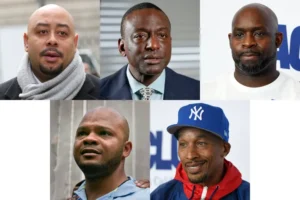Trump once wanted these five black men dead, even though the courts adjudged them innocent of the crime he still blames on them.
The five men (pictured below), known as the Central Park Five, spent years in prison for a crime they officially didn’t commit. They’ve been fully exonerated, and an actual perpetrator confessed, with his involvement confirmed by DNA evidence. The City of New York settled the five men’s wrongful imprisonment claims for $41 million. Read about the details of the case, legal proceedings, and aftermath here.
Despite their exoneration and the civil settlement, some police officials and Donald Trump continue to insist the five men participated in the crime. Trump repeated this assertion in the Trump-Harris presidential debate on September 10, 2024, adding that the victim was killed (she wasn’t; she’s alive today).
The five men filed a defamation suit against Trump on Monday, October 21, 2024 (see story here). Whether the case proceeds could hinge on whether they’re “public figures.” Even if he’s wrong, a good-faith belief supported by opinions of police detectives and the investigations and reports about prosecutors’ handling of the case, might obviate the “actual malice” required under New York Times v. Sullivan to sue for defamation if the plaintiffs are “public figures.”
Media coverage made them famous, but does mere notoriety make a person “public figure”? What if they’re innocent, and just want to live private lives, unmolested? Does that entitle them to sue Trump based on the simple falsity of his statement? In this connection, it should be noted their exoneration makes his claim they’re guilty presumptively false for legal purposes.
One of the five, Yusef Salaam, became a politician and was elected to the New York city council. That makes him a public figure. The other four, however, can argue they’re private citizens, and should be summary judgment on the question of liability, and the only question for a jury is the amount of damages.
If you ask me, this is a good case for a law school or bar exam question.
